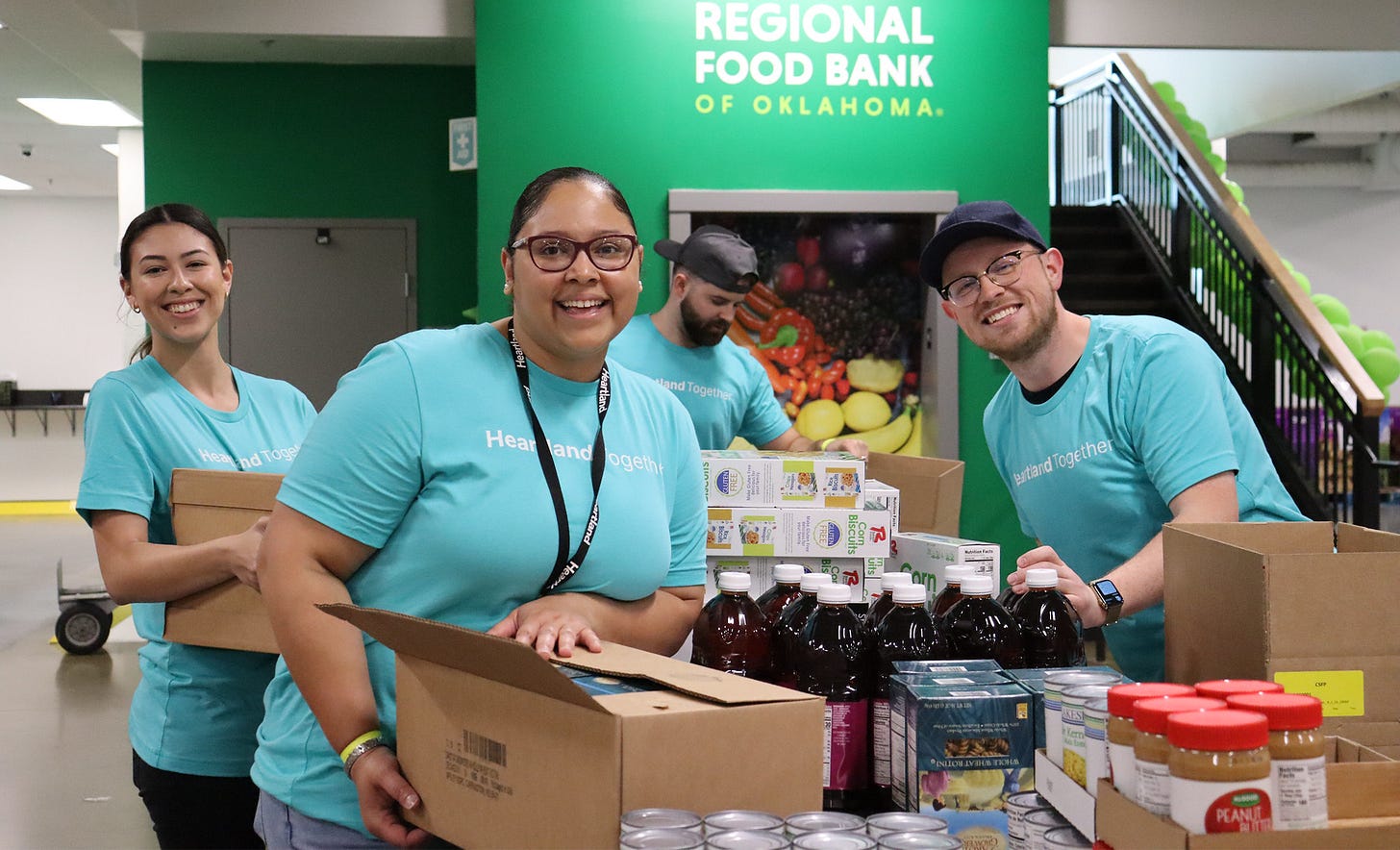
I've read several articles recently about what the media or politicians have been "normalizing" of late. While it’s a worthy topic because this practice can give the public a false sense of what is happening and how alarmed they need to be, I’d like to suggest that normalization doesn’t always have to be dangerous or manipulative. It might just have positive applications.
By mindfully adopting new habits and practices, we begin to establish a new normal, and things that once seemed unlikely or even unimaginable for us gradually come within reach. Because our perception of what is normal can and does evolve over time, I propose that we use this fact at a personal level to decide what we want to normalize in our own lives in 2025.
So, for our purposes today, let’s set aside what the politicians and media are doing and consider instead what we want our normal to be. Truth-telling? Self-care? Joy? I will invite you to first consider what is normal or typical for you right now and how that has evolved over time. Then we’ll consider any conscious changes you might want to adopt in the coming year or beyond.
If you aren’t sure your concept of normal even changes that much over time, you need only compare a typical day in your life as a toddler to when you were a teen or became an adult. Obviously, normal behavior and experiences for a 2-year-old are no longer considered normal for a grownup. And age is by no means the only factor in what you perceive as normal. Your environment matters, including the culture you operate in.
As we approach the end of one year and anticipate the next one—especially if there has been major change in our lives, such as a new job, marriage, child, home, or president—it’s natural to reflect on what has happened and what’s ahead.
Holiday seasons especially lend themselves to reflection because they are recurring markers in time. As I pulled out the decorations for our Christmas tree this year, I was immediately reminded how many have stories associated with them from Christmases past. I also recalled previous trees I’ve decorated and the circumstances of my life at those times.
For probably 40 years, I’ve pulled out this George Winston album (originally on vinyl, later CD, and now streaming) along with a few others to listen to while festooning the tree. Some years, I did so right after Thanksgiving; other years, I’ve trimmed the tree as late as Christmas Eve.
Consider what felt normal to you before vs. after big moments in your life…
before you graduated
pre-9/11 (for those who travel and especially for those who lost loved ones)
before you had children
pre-covid
before your diagnosis
before you moved out
before you learned to drive (or cook or sew or speak English)
before the accident
What feels normal to us can change quite dramatically over the course of our lives. Some changes we have little or no control over. Other shifts are initiated by our own choices.
I’ve offered dramatic illustrations here because it’s easy to see the change in what feels normal before and after pivotal events. It can happen in the blink of an eye and nothing is ever the same again. But more often the changes are subtle and more gradual. I’m less physically active than I used to be, for example. I do far less singing than I used to since I no longer teach voice lessons or direct choirs.
There are things we can’t control, of course, but there are others we could at least influence but often don’t because we are creatures of habit or because decline happens gradually over time and we don’t notice how the routine that worked for us 10 or 15 years ago no longer serves us.
Another challenge is that many of us are better at addition than subtraction. We easily think of what we’d like more of, but it’s harder to discern what we need less of. Yet letting go of what no longer serves or interests us as much as it once did is how we create space for trying new things or expanding the things we want to focus on now. So, as we periodically take inventory of our lives, it’s worth watching for mindless activities we might reduce, simplify, or eliminate in favor of more satisfying ones.
I used to spend a great deal of time decorating (and shopping) for various holidays, season after season, and I’m glad I did. It brought me and I hope others a lot of joy. But there came a time when what it cost me in time, money, and effort began to outpace the real satisfaction I felt from it, and meeting my self-imposed expectations just didn’t make sense anymore. I had other priorities. To my amazement, the world kept turning whether I had a fall display or Christmas tree or packages that looked professionally wrapped or not.
We don’t always need to come to a convenient stopping place or justify our change of heart; we can just stop. This fact abruptly becomes clear when there’s an emergency and circumstances force us to make a change that we had previously been reluctant to make. It’s a little like when Glenda the good witch explains to Dorothy that she had the power to go home all along. How much nicer to initiate those changes ourselves, though, while we can still substitute something that makes more sense for us rather than waiting for some catastrophe to take away our options.
I was listening to a podcast interview that Oprah Winfrey did this month with author Mel Robbins who has a new book called The Let Them Theory. The book was in pre-order until today, so I haven’t read it, but Oprah had, and they discussed the fact that the concepts Mel Robbins presents aren’t brand new. Teachers and religions have been making similar points for years, but Mel uses very easy-to-understand language and examples from a big ah-ha moment she had.
I’ll post the interview below so you can listen to the whole thing if you’d like, but in a nutshell, Mel was spiraling into an anxious and controlling episode with her young son who had made a last-minute decision to attend his high school prom. Mel’s daughter, who is older than her brother, stepped in to help her mom see that her reactions weren’t helpful.
Mel, near panic, would explain, “But they don’t have dinner reservations!” and “It’s pouring rain and they’ll get soaked!” and on down the list. Each time the mother raised a concern, her daughter gently but firmly said, “Mom, let them…”
Let them go without reservations.
Let them get wet.
Let them figure out transportation.
Let them figure out dinner.
Let them deal with the consequences.
Somehow, the cascading phrase “Let them…” was exactly what Mel Robbins needed to hear because she was able to step back and let go of some of her overly controlling behavior in that moment, to everyone’s benefit.
The next day, in a different situation Mel was starting to feel anxious about, she recalled her daughter’s directive, “Let them…” and those magic words helped her again.
Somehow, hearing, “Mel, you need to let it go!” had never worked for her. If anything, it only sparked more internal resistance on her part, and she would always dig in. But the simpler, “let them” felt doable and surprisingly calming.
As Mel continued to work with this concept it became clear that there’s a Part II after “Let them…” which she says is, “Let me….” Releasing the need to control others freed up time and energy that Mel could devote to her true priorities.
For me, it harkens back to the Reinhold Niebuhr quote I closed my December 10 essay with: the serenity to accept the things I cannot change, the courage to change the things I can, and wisdom to know the difference.
In Mel Robbins’ case, Let them… (and eventually, Let me…) spoke to her in a way that “Let go.” never had. It felt not only more attainable but freeing. Here’s the interview if you are curious.
As an English teacher (ESL/EFL), it’s always fascinating to me what a difference the right words can make depending on the person or situation, and one of the things that struck me as I heard Mel’s conversation with Oprah was how finding the right language was key to her revelation.
Mel had heard and read many times about the importance of “letting go” or not letting things bother you, but it was easier said than done. Somehow, she never tapped into the desire or willingness or perhaps ability to do that consistently. But something clicked when she heard her daughter repeatedly say, Let them. It prompted Mel to release something that had long weighed her down.
So as you experiment with what you might want to normalize in your life next year, I encourage you to play with the language if it doesn’t speak to you. I see no value in getting caught up in semantics over the distinction between normal and typical, for example. Whatever words you use, there are some real differences in how people approach the new year…
A traditional term that springs to mind is the New Year’s Resolution, but resolutions are notoriously short-lived, and most of us have an unimpressive track record with them. I don’t know many people who even bother to make them anymore. Do you?
Some folks have better luck with goals or aims or setting intentions. I do think deciding what we’d like to normalize is a powerful form of intention setting. Another popular approach I’ve enjoyed in some years is choosing a Word of the Year that serves as a theme or guide. You could even combine choosing a word with intention setting, letting your chosen word help guide your intentions… or allowing your various intentions to lead you toward a unifying theme.
Other people have given up on the whole concept and prefer to leave any goal-setting they might want to do for some other point in the year without all that heavy new year baggage attached. That’s perfectly understandable.
I’m suggesting “normalization” as an alternative to resolution-making or goal-setting. Is this a sneaky way of making resolutions and just calling it something else? No, I don’t think so. New Year’s Resolutions are often about self-improvement. You resolve to do something you ought to do. What I’m talking about has more to do with life improvement. (But don’t be surprised if you improve along with it.)
To my mind, normalizing the kinds of experiences you would like to include in your new year is about crafting an environment in which you can create more of the life you want without forcing things or arbitrarily deciding all the details of the next 365 days just because it’s January 1. It’s the difference between giving yourself orders and giving yourself permission.
What might this look like? Well, I’m still thinking about what I’d like to focus on in 2025, but some examples of things I want to normalize are moving more and eating well. I also want to normalize reading books and getting more sleep at night. That feels very different to me than resolving to read a book a week, lose 20 pounds, and sleep 8 hours every night.
We tend to habitualize whatever is normal for us. Habits become stronger—and often easier to accomplish—with repetition. We don’t need threats and big incentives or accountability partners for our established habits because we do them on auto-pilot. It doesn’t matter whether we do them perfectly or not. I don’t have to ask Siri to remind me to brush my teeth; I just do it as part of my normal routine.
My theory—yet untested because it’s my first go at this—is that I simply need to make a sincere and reasonable decision about the things I want to become a normal part of my 2025 experience and cross the threshold into the new year with that sustained intent, checking in with myself periodically so as not to lose sight of my vision for the year, and then allow myself to either grow into those intentions—or let those intentions evolve further as the year unfolds and life happens.
Will some people do better with SMART (specific, measurable, achievable, relevant, and time-bound) Goals? Maybe. If you are that person, you probably already know it. Do what works for you.
For me, SMART Goals have their place in some projects. So does resolve, for that matter. But it’s not necessarily the energy I want to invoke as January unfolds. I’d like something gentler, more flexible, and expansive that I can gradually form into the kind of year I want or need, one tortoise step at a time.
Normalization is a process rather than something that happens overnight. We are developing new habits and routines, not waving a magic wand. Normal is, by definition, not particularly special or unusual, so it needn’t require superhuman effort or enormous resolve. It mostly calls for a little attention and repetition, especially when it is undergirded by genuine desire. If you struggle a bit or slip up at some point, it’s not the end of the world. No need to beat yourself up. You simply take a breath and try again.
What would you like to normalize in your life in 2025?
Eating well?
Getting enough rest?
Being kind?
Saving money?
Helping others?
Asking for help when you need it?
Paying attention to where you are spending your precious time or energy?
Doing some things the easy way?
Reading more books?
Daily gratitude?
Setting healthy boundaries?
Writing your representatives?
Doing more volunteer work?
Getting out in nature more often?
Starting and ending your day with prayer or meditation?
Writing (or painting or singing…) every day?
Going on road trips?
Reminding yourself to “Let them…” more often?
Trying new things?
Noticing beauty?
Listening to music or podcasts while doing mindless tasks you don’t love?
Being on time?
Taking action imperfectly, without shame?
Noting the difference between what you can and cannot control?
Listening to that still small voice of inner wisdom and following its guidance?
You are probably already doing quite a few of these things. Others will not interest you. You can choose the ones that do or come up with your own list.
Inspired by my English students, I’d love to see more Americans normalize learning and speaking other languages and especially learning about other cultures.
Please note that the intentions you set need not be lofty. Maybe you want to normalize making sandwiches, lighting candles, writing thank you notes, baking bread, or doing your own nails. Remember that doing less of some things (social media, trying to control others, buying things you don’t need or have to maintain…) will free up time and energy for higher priorities.
The ideas above are just to get you started. If one or two strike a chord with you, maybe spend a little extra time with those. You might want to journal about ways you could adopt a particular practice as a normal part of your life. Use your imagination and be sure to consider any dreams you have set aside for a long time. This might be the year to finally give them a little air. It’s okay to start with tortoise steps.
Finally, just because something is normal for you doesn’t mean you can never do it any other way. You retain agency and the right to change your mind or focus at any point. There’s no deadline or limit to how many things you can put on your list. Maybe you’d like to start with one or two and add from there, fitting in more when you can, understanding that you’ll have to work around some obstacles that are beyond your control.
Little things add up. Over time, we can normalize either healthy or unhealthy behaviors and experiences—things that will make our lives better or worse. Why not craft the kind of routine that works in your favor each day rather than against you?
What would you like to normalize in 2025?












Fresh air here
Inhale deeply.
This past year much of what I saw as self indulgent, I've come to realize is actually selfcare...naps, art journaling,reading,fasting, saying yes, saying no...this next year I want to normalize selfcare, honoring my body and soul in this chapter I've wrestled with so frequently.